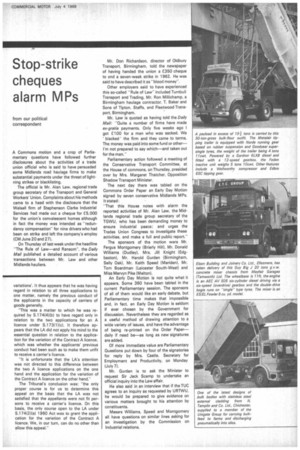Stop-strike cheques alarm MPs
Page 31

If you've noticed an error in this article please click here to report it so we can fix it.
from our political correspondent A Commons motion and a crop of Parliamentary questions have followed further disclosures about the activities of a trade union official who is said to have persuaded some Midlands road haulage firms to make substantial payments under the threat of lightning strikes or blacklisting.
The official is Mr. Alan Law, regional trade group secretary of the Transport and General Workers' Union. Complaints about his methods came to a head with the disclosure that the Walsall firm of Stephenson Clarke Industrial Services had made out a cheque for £5,000 for the union's convalescent homes although in fact the money was intended as "redundancy compensation" for nine drivers who had been on strike and left the company's employ (CM June 20 and 271.
On Thursday of last week under the headline "The Rule of Law—and Ransom", the Daily Mail published a detailed account of various transactions between Mr. Law and other Midlands hauliers.
Mr. Don Richardson. director of Oldbury Transport, Birmingham, told the newspaper of having handed the union a £350 cheque to end a seven-week strike in 1962. He was said to have described it as "blood money".
Other employers said to have experienced this so-called "Rule of Law" included Turnbull Transport and Trading, Mr. Ron Millichamp, a Birmingham haulage contractor, T. Baker and Sons of Tipton, Staffs, and Fleetwood Transport, Birmingham.
Mr. Law is quoted as having told the Daily Mail: "Quite a number of firms have made ex-gratia payments. Only five weeks ago I got £100 for a man who was sacked. We ' blacked ' the firm and they came to terms. The money was paid into some fund or other— I'm not prepared to say which—and taken out for the man."
Parliamentary action followed a meeting of the Conservative Transport Committee, at the House of commons. on Thursday, presided over by Mrs. Margaret Thatcher, Opposition Shadow Transport Minister.
The next day there was tabled on the Commons Order Paper an Early Day Motion signed by seven conservative Midlands MPs. It stated: "That this House notes with alarm the reported activities of Mr. Alan Law, the Mid lands regional trade group secretary of the TGWU. who has been demanding money to ensure industrial peace, and urges the Trades Union Congress to investigate these activities, and make a full and public report." The sponsors of the motion were Mr. Fergus Montgomery (Brierly Hill), Mr. Donald Williams (Dudley), Mrs. Jill Knight (Edgbaston), Mr. Harold Gurden (Birmingham, Selly Oak), Mr, Keith Speed (Meriden). Mr. Torn Boardman (Leicester South-West) and Miss Mervyn Pike (Melton).
An Early Day Motion is not quite what it appears. Some 360 have been tabled in the current Parliamentary session. The sponsors of all of them would like an early debate, but Parliamentary time makes that impossible and, in fact, an Early Day Motion is seldom if ever chosen by the Government for discussion. Nevertheless they are regarded as a useful method of drawing attention to a wide variety of issues, and have the advantage of being re-printed on the Order Paper— daily if need be—as long as new signatures are added.
Of more immediate value are Parliamentary Questions put down by four of the signatories for reply by Mrs. Castle, Secretary for Employment and Productivity, on Monday (July 7).
Mr. Gurden is to ask the Minister to request Sir Jack Scamp to undertake an official inquiry into the Law affair.
He also said in an interview that if the TUC agrees to an inquiry as requested by URTVVU, he would be prepared to give evidence on various matters brought to his attention by constituents.
Messrs Williams, Speed and Montgomery all have questions on similar lines asking for an investigation by the Commission on Industrial relations.




























































































































































